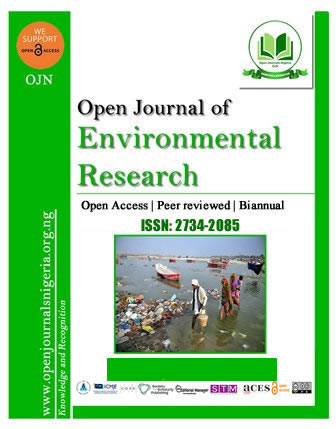INFLUENCE OF SOME SELECTED ENVIRONMENTAL FACTORS ON THE NATURAL ATTENUATION OF ATRAZINE IN TROPICAL AGRICULTURAL SOILS
DOI:
https://doi.org/10.52417/ojer.v5i1.617Abstract
Understanding environmental factors that help to optimize the natural attenuation of atrazine in agricultural soils is necessary to minimize contamination risks and human health risks, as well as support a healthy soil ecosystem. This study, therefore, investigated the influence of pH, temperature, soil organic matter content, often measured as total organic carbon (TOC), and moisture content on atrazine attenuation by soil microbes. Agricultural soil with a history of atrazine application was spiked with the herbicide. The effects of pH (3, 7, 10), moisture content (10%, 15%, 25%), total organic carbon (TOC, 2%, 3%, 4%), and temperature (15°C, 25°C, 45°C) on atrazine attenuation and bacterial count were evaluated at the interval of 30 days each for 60 days of incubation in nutrient agar. The residual concentrations of atrazine attenuation were determined using GC-MS analysis at the interval of 30 days each for 60 days of incubation. The results indicate that higher bacterial counts (Arthrobacter sp.) were observed at neutral pH (7.0) and moderate moisture (10%). At a neutral pH (7), only 52.1% of the initial atrazine concentration remained after 60 days due to attenuation processes. Also, Atrazine natural attenuation increased with increasing TOC where only 25.8% attenuation residual concentration was left at 4% TOC and reached a maximum of 15% moisture content with a residual concentration of 20.13% after 60 days. Similarly, the concentration of atrazine decreased as the temperature increased, with only 29.01% of the residual concentration remaining at 45ºC treatment after 60 days. Statistical analysis revealed significant differences in natural attenuation between 30 and 60 days, but not after 30 days. These findings suggest that natural attenuation was favoured by higher organic matter content and moderate moisture levels, highlighting the importance of soil properties for atrazine fate in tropical soils and emphasizing the importance of studying natural attenuation processes as a viable strategy, particularly in tropical agricultural settings to minimize unnecessary contamination of soil to ensure a healthy and safe agricultural environment.
Published
How to Cite
Issue
Section
Copyright (c) 2024 Maijama et al.

This work is licensed under a Creative Commons Attribution 4.0 International License.




















